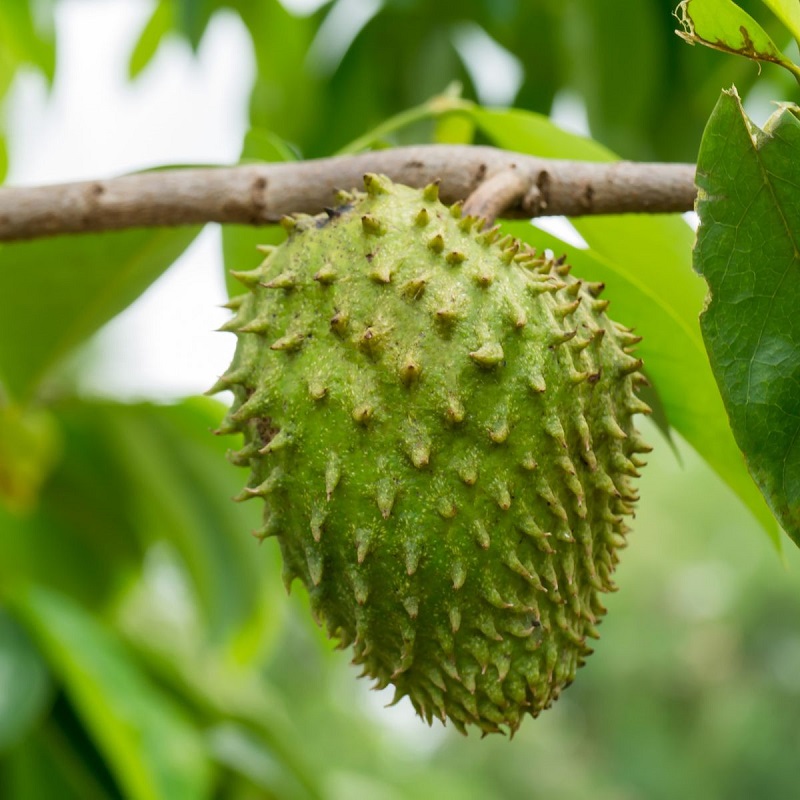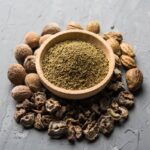
Have you ever heard about the tropical fruit Soursop? Yes! The prickly tropical fruit is an excellent addition to your diet since it offers several health benefits. The appearance and taste of Soursop is similar to custard apple and cherimoya. However, this fruit has tiny shiny seeds covered with white and sweet pulpy flesh. Soursop is also known as Graviola, Guanabana and in India, it is known as Lakshman phal. We can also get many health benefits from soursop fruit and soursop leaves. Along with Soursop benefits, it is an excellent addition to sweet foods, beverages, ice cream, giving them a creamy texture.
This article has discussed the benefits of Soursop fruit and leaves, its nutritional profile, and its side effects. Read on!
Did You Know
Soursop is named so because of its slightly acidic and sour taste when it ripens.
What Is Soursop?
Soursop (Lakshman Phal) is the fruit of Annona muricata, a type of tree native to America’s tropical regions and India, also known as Graviola, Guanabana (1). This prickly fruit’s flesh is juicy and soft, whose colour is dark green when raw, and as it ripens, it turns slightly light green. Typically, Soursop is cut in half, scooping out the flesh and eaten raw.
Soursop Nutrition Facts
Check out here what are the soursop nutritional benefits in detail.
Soursop contains abundant amounts of vitamin C and several B vitamins like thiamin, riboflavin, and niacin as well as minerals like calcium, phosphorus and a small amount of iron. The fruit comprises of 67.5% pulp, 20% fruit skin, 8.5% fruit seeds and 4% core pieces. Know about nutritional benefits of soursop fruit.
| NUTRITIONAL VALUE PER 100 G (3.5 OZ) | |
|---|---|
| Energy | 276 kJ (66 kcal) |
| Carbohydrates | 16.84 g |
| Sugars | 13.54 g |
| Dietary fiber | 3.3 g |
| Fat | 0.3 g |
| Protein | 1 g |
| Thiamine (vit. B1 | 0.07 mg (6%) |
| Riboflavin (vit. B2) | 0.05 mg (4%) |
| Niacin (vit. B3) | 0.9 mg (6%) |
| Pantothenic acid | 0.253 mg (5%) |
| Vitamin B6 | 0.059 mg (5%)g |
| Folate | 14 μg (4%) |
| Choline | 7.6 mg (2%) |
| Vitamin C | 20.6 mg (25%) |
| Calcium | 14 mg (1%) |
| Iron | 0.6 mg (5%) |
| Magnesium | 21 mg (6%) |
| Phosphorus | 27 mg (4%) |
| Potassium | 278 mg (6%) |
| Sodium | 14 mg (1%) |
| Zinc | 0.1 mg (1%) |
Intake of soursop seeds is not advised due to the presence of antinutrients. However, cooking the seeds can reduce the concentration of these compounds and help one reap the benefits of these seeds.
The following graph showcases the nutritional values of the various vitamins in both raw and cooked soursop seeds. While cooking reduces the amount of vitamins present, it also reduces the antinutrients.
Nutrition Profile Of Soursop Seeds (Raw Vs. Cooked)
Source: Nutritional Profile and Determination of the Biological Value of the Raw and Cooked Soursop Seeds
Ah well, we have seen the rosy part of the fruit till now. Now it’s time to peer at the other side.
What Does Soursop Do For Your Body?
Soursop contains numerous phytonutrients that can fight disease-causing cells and even certain kinds of tumors. These phytonutrients contain antioxidant properties that enhance the overall health. They help fight cancer, enhance eye health, and treat a range of infections (1).
Top 10 Health Benefits of Soursop Fruit and Leaves
1. Protect Your Skin and Cells from Environmental Oxidative Damage
Soursop benefits include the high amounts of Vitamin C that help boost immune health as an antioxidant. This vitamin helps your body defend itself against pathogens. It also helps protect your skin against environmental oxidative damage by promoting the destruction of free radicals.
2. Soursop Rich In Vitamin C
Vitamin C is an antioxidant known to boost your body’s immune health. Soursop is a rich source of Vitamin C that helps improve your body’s ability to defend against pathogens by strengthening your immune system. It also protects your skin and cells from environmental oxidative damage by promoting the destruction of free radicals.
3. Soursop High In Antioxidants
The high content of antioxidants in Soursop provides many benefits to our body. Antioxidants are compounds that protect our bodies from any damage caused by free radicals by neutralizing these harmful compounds.
According to some research, the uses of Graviola include reducing the risk of heart disease, diabetes, cancer come from the role played by antioxidant properties (2).In addition, the antioxidant properties of Soursop are found to be effective in protecting your body from free radical damage, according to a test-tube study (3).
According to another test-tube study, Graviola also has plant compounds such as luteolin, quercetin and tangeretin that act as antioxidants (4). However, more research is needed to show the benefits of antioxidants in Soursop for humans.
4. Graviola Help To Reduce Inflammation
Soursop’s health benefits include its anti-inflammatory properties in juice and leaves. According to a Brazilian study, Soursop leaves and juice administration improves inflammation caused by snakebite (5). However, more research is needed in this aspect because some Graviola components might slightly aggravate the ill effects.
The anti-inflammatory properties of the roots, barks and leaves of the Soursop tree is emphasized in the research conducted in South America and tropical Africa (6).
You will get relief from arthritis by treating inflammation using Graviola. It is also known for its analgesic and anti-inflammatory effects (7).
5. Soursop Strengthens Your Immune System
According to a Korean study, the bioactive compounds of Soursop help enhance immunity. In this study, the edema in rat paws caused by the weak immune system has been reduced with oral intake of Soursop leaf extracts (8). It can be efficient in treating immunocompromised patients with the potential of Graviola leaves in stimulating immunity. You can also improve the overall lifestyle quality by including Graviola in your diet.
Soursop fruit juice has a lot of micronutrients compared to the pulp. But compared to juice, the Graviola pulp has more vitamin A. In addition, the ascorbic acid (Vitamin C) present in Sourcop boosts and strengthens your immune system. So even with Beta-carotene, the precursor of vitamin A, immune system enhancement is possible.
6. Graviola Promotes Digestive Health
You can get about 83% of the daily recommended allowance of fibre from one whole Soursop fruit. In addition, soursop extract benefits include promoting healthy digestive health because of its fibre content (9). This fruit also eliminates excess sodium from the body by cleansing the gastrointestinal tract by acting as a diuretic.
7. Soursop Benefits Cancer
Graviola extracts were found to kill specific breast and liver cancer cells, though there haven’t been any direct human studies. Soursop’s benefits include treating cancer and many types of diseases (10). Though the probabilities are promising, there is a need for tests on humans.
Soursop or Graviola leaves benefits to include 80% cell inhibition, according to an Indian study conducted on various cell lines. On the other hand, the inhibition of harmful compounds in cancer cells comes from the acetogenins in Graviola (11).
There is an indication of potential success in curing the lethal disease with the help of Soursop extracts that inhibit the survival and metabolism of pancreatic cancer cells (12). The unique ability of acetogenins is that they don’t harm the healthy cells while selectively destroying the cancer cells (13).
8. Lowers Your Blood Pressure
If you wish to treat hypertension, Soursop has been an optimal solution. According to a Nigerian study, the benefits of Soursop in treating hypertension is attributed to the antioxidant potential of phenols in the fruit (14). Furthermore, according to Indonesian research, Soursop helps lower blood pressure levels in human adults with nutrients in Graviola.
9. Helps Fight Bacteria
Soursop can be beneficial in dealing with diseases caused by parasites and bacteria transmitted through sand fleas and bites, one of those being leishmaniasis. You can also treat a wide range of infections with the help of Soursop leaves (15).
10. Soursop Benefits Diabetes
Soursop is good for diabetes because of its anti-diabetic properties, according to a Nigerian study (16). In addition, you will be able to inhibit the hepatic oxidative damage caused in diabetes patients with the help of the soursop leaf aqueous extract (17).
11. Soursop Leaf Tea For Weight Loss
Graviola leaf tea can be beneficial for weight loss because it optimizes the body’s metabolism since it contains a high combination of B vitamins. In addition, this process helps you stay active by helping you with exercise. Graviola encourages the burning of additional fat with the help of dietary acids such as linoleic acid.
Additionally, the Soursop leaf extracts help reduce body weight in obese mice over 12 weeks, according to a study (18). Furthermore, while ingesting Graviola extracts, these overweight mice also experienced healthier cholesterol levels.
Side Effects Of Soursop
Here are some of the side effects associated with the excess consumption of Soursop:
- The Soursop tree’s bark and seeds contain potentially poisonous compounds such as muricine, hydrocyanic acid and anonaine that are considered toxic and can cause inflammation to the eyes.
- The developing fetus’s high energy cells might trigger the toxic activity of Graviola. Therefore pregnant women are advised against consuming this fruit.
- Some people involved in an experiment had a drastic weight loss with the consumption of Soursop. So, if you have any issue with body weight, consult your doctor before consuming this fruit.
- Consumption of Graviola might result in the development of Parkinson’s disease, as per a French study (19).
How to Eat Soursop (Lakshman Phal)?
Here are some of the easy and quick Soursop recipes you can try to reap the benefits of this fruit.
1. Soursop Ice Cream
Ingredients
- 1 cup of cream
- 3 cups of soursop pulp
- 1/4 cup of inverted sugar syrup
- 1 1/2 cups of fresh milk
- 1 teaspoon of vanilla extract
- 1/2 teaspoon of lime juice
- Eggs, as required
Preparation
- In a medium-sized pot over medium heat, place the pulp, cream, and milk. Wait until it boils. Keep stirring to prevent the ingredients from sticking to the pot.
- Remove from the heat.
- Whip the eggs along with the inverted sugar syrup until it turns creamy.
- Mix the soursop cream with the egg cream. Heat until it boils again. Keep stirring occasionally. Remove from the heat.
- Whip the entire mixture with a hand mixer until it turns creamy.
- Let it cool down. Place it in a glass container and put it in the freezer.
- Every hour, remove from the freezer and whip quickly, and then return it to the freezer. Repeat this 4 to 5 times. The mixture must attain the consistency of ice cream.
- You can refrigerate the ice cream in a glass container (must be sealed).
You can prepare the inverted sugar syrup using 2 pounds of sugar, 2 cups of water, and 1/4 teaspoon of cream of tartar. Mix all the ingredients and bring them to a boil. Remove the cover and let it cool completely.
2. Soursop Smoothie
Ingredients
- One cup of Soursop pulp.
- ½ cup of plain yoghurt.
- Three tbsp of sweetened condensed milk.
- Eight ice cubes.
Preparation
- Place all the ingredients into a blender jar.
- Blend the contents thoroughly, forming a smooth mixture.
- Serve immediately.
2. Soursop Juice
Ingredients
- Soursop – 16oz.
- One cup of milk.
- Two tbsp of sugar.
- One cup of water.
- Two tbsp of mint leaves.
- Two cups of ice.
Preparation
- Take Soursop, peel it and eliminate the core.
- Remove the seeds and use a fork to pull the pulp apart.
- Add all the ingredients into a blender and blend them into a smooth paste.
- Add water to liquify the mixture.
- Strain to separate the pulp to get the juice into a glass.
- Add mint leaves and ice to the liquid and serve fresh.
3. How to Make Soursop Leaves Tea
Ingredients
- Two soursop leaves.
- One cup of milk (optional).
- Sugar as per taste.
Preparation
- Take a bowl of water and boil them.
- Add the two soursop leaves to the boiling water.
- Let it steep for about two minutes.
- Add sugar as per your taste.
- Adding milk is optional.
How To Select And Store Soursop?
If you want to choose and preserve soursop, here are some tips:
- When selecting soursop, look for fruit that is firm, heavy, and green with no signs of bruising or soft spots.
- You can ripen soursop at room temperature until it becomes softer and the skin turns slightly yellow. You can also store it in the refrigerator to slow down the ripening process.
- To store soursop, place it in a plastic bag and keep it in the refrigerator for up to 5 days.
- You can also freeze soursop by cutting it into pieces, removing the seeds and storing them in an airtight container or freezer bag. Frozen soursop can last for up to 6 months.
- If you want to use soursop for a recipe, you can blend it into a puree and freeze it in an ice cube tray for convenient portions.
By following these steps, you can select and store soursop to keep it fresh and tasty for longer periods of time.
Frequently Asked Questions
Is it safe to consume Soursop?
Yes, soursop is safe to consume in moderate amounts as a part of a balanced diet. In fact, soursop is a rich source of vitamins, minerals, and antioxidants that offer numerous health benefits. It is also a good source of fiber and has been traditionally used to treat various ailments.Is soursop acidic or alkaline?
Soursop is generally considered to be acidic, as its pH level typically ranges from 3.8 to 4.8. This is due to the presence of organic acids such as citric acid, malic acid, and tartaric acid in the fruit.Can you drink soursop tea every day?
While soursop tea has many potential health benefits, it’s important to consume it in moderation and as a part of a balanced diet. There is no specific recommended daily intake of soursop tea, but it’s generally considered safe to drink a cup or two per day.Does soursop make you sleepy?
There is no scientific evidence to suggest that soursop can make you sleepy. In fact, soursop is often used in traditional medicine as a natural energy booster due to its high nutrient content, including vitamins, minerals, and antioxidants.What is the best time to drink soursop tea?
It’s recommended to drink soursop tea between meals, as drinking it immediately before or after a meal can interfere with the absorption of nutrients from food.
Key Takeaways
- Soursop is a fruit that is packed with vitamins, minerals, and antioxidants that offer numerous health benefits.
- The high vitamin C content in soursop can help to boost the immune system and promote overall health.
- Soursop has been traditionally used to treat various ailments such as fever, inflammation, and respiratory problems.
- Soursop has potential cancer-fighting properties, and some studies suggest that it may help to prevent the growth of cancer cells.
- Soursop may also promote healthy hair growth and prevent hair loss, thanks to its high vitamin C and antioxidant content.
- While soursop has many potential health benefits, it’s important to consume it in moderation and as a part of a balanced diet




























